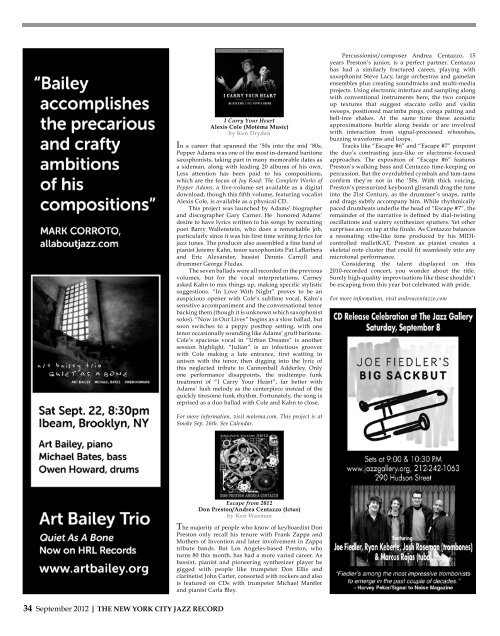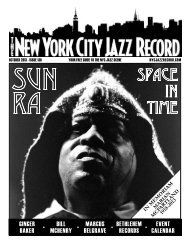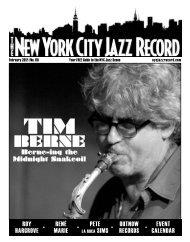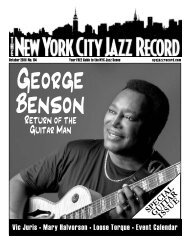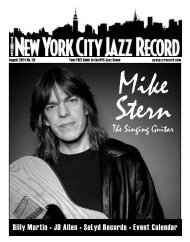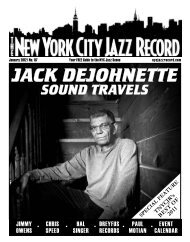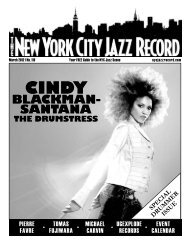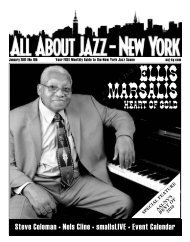September 2012 - The New York City Jazz Record
September 2012 - The New York City Jazz Record
September 2012 - The New York City Jazz Record
You also want an ePaper? Increase the reach of your titles
YUMPU automatically turns print PDFs into web optimized ePapers that Google loves.
34 <strong>September</strong> <strong>2012</strong> | THE NEW YORK CITY JAZZ RECORD<br />
I Carry Your Heart<br />
Alexis Cole (Motéma Music)<br />
by Ken Dryden<br />
In a career that spanned the ‘50s into the mid ‘80s,<br />
Pepper Adams was one of the most in-demand baritone<br />
saxophonists, taking part in many memorable dates as<br />
a sideman, along with leading 20 albums of his own.<br />
Less attention has been paid to his compositions,<br />
which are the focus of Joy Road: <strong>The</strong> Complete Works of<br />
Pepper Adams, a five-volume set available as a digital<br />
download, though this fifth volume, featuring vocalist<br />
Alexis Cole, is available as a physical CD.<br />
This project was launched by Adams’ biographer<br />
and discographer Gary Carner. He honored Adams’<br />
desire to have lyrics written to his songs by recruiting<br />
poet Barry Wallenstein, who does a remarkable job,<br />
particularly since it was his first time writing lyrics for<br />
jazz tunes. <strong>The</strong> producer also assembled a fine band of<br />
pianist Jeremy Kahn, tenor saxophonists Pat LaBarbera<br />
and Eric Alexander, bassist Dennis Carroll and<br />
drummer George Fludas.<br />
<strong>The</strong> seven ballads were all recorded in the previous<br />
volumes, but for the vocal interpretations, Carney<br />
asked Kahn to mix things up, making specific stylistic<br />
suggestions. “In Love With Night” proves to be an<br />
auspicious opener with Cole’s sublime vocal, Kahn’s<br />
sensitive accompaniment and the conversational tenor<br />
backing them (though it is unknown which saxophonist<br />
solos). “Now in Our Lives” begins as a slow ballad, but<br />
soon switches to a peppy postbop setting, with one<br />
tenor occasionally sounding like Adams’ gruff baritone.<br />
Cole’s spacious vocal in “Urban Dreams” is another<br />
session highlight. “Julian” is an infectious groover<br />
with Cole making a late entrance, first scatting in<br />
unison with the tenor, then digging into the lyric of<br />
this neglected tribute to Cannonball Adderley. Only<br />
one performance disappoints, the midtempo funk<br />
treatment of “I Carry Your Heart”, far better with<br />
Adams’ lush melody as the centerpiece instead of the<br />
quickly tiresome funk rhythm. Fortunately, the song is<br />
reprised as a duo ballad with Cole and Kahn to close.<br />
For more information, visit motema.com. This project is at<br />
Smoke Sep. 26th. See Calendar.<br />
Escape from <strong>2012</strong><br />
Don Preston/Andrea Centazzo (Ictus)<br />
by Ken Waxman<br />
<strong>The</strong> majority of people who know of keyboardist Don<br />
Preston only recall his tenure with Frank Zappa and<br />
Mothers of Invention and later involvement in Zappa<br />
tribute bands. But Los Angeles-based Preston, who<br />
turns 80 this month, has had a more varied career. As<br />
bassist, pianist and pioneering synthesizer player he<br />
gigged with people like trumpeter Don Ellis and<br />
clarinetist John Carter, consorted with rockers and also<br />
is featured on CDs with trumpeter Michael Mantler<br />
and pianist Carla Bley.<br />
Percussionist/composer Andrea Centazzo, 15<br />
years Preston’s junior, is a perfect partner. Centazzo<br />
has had a similarly fractured career, playing with<br />
saxophonist Steve Lacy, large orchestras and gamelan<br />
ensembles plus creating soundtracks and multi-media<br />
projects. Using electronic interface and sampling along<br />
with conventional instruments here, the two conjure<br />
up textures that suggest staccato cello and violin<br />
sweeps, positioned marimba pings, conga patting and<br />
bell-tree shakes. At the same time these acoustic<br />
approximations burble along beside or are involved<br />
with interaction from signal-processed whooshes,<br />
buzzing waveforms and loops.<br />
Tracks like “Escape #6” and “Escape #7” pinpoint<br />
the duo’s contrasting jazz-like or electronic-focused<br />
approaches. <strong>The</strong> exposition of “Escape #6” features<br />
Preston’s walking bass and Centazzo time-keeping on<br />
percussion. But the overdubbed cymbals and tam-tams<br />
confirm they’re not in the ‘50s. With thick voicing,<br />
Preston’s pressurized keyboard glissandi drag the tune<br />
into the 21st Century, as the drummer’s snaps, rattle<br />
and drags subtly accompany him. While rhythmically<br />
paced drumbeats underlie the head of “Escape #7”, the<br />
remainder of the narrative is defined by dial-twisting<br />
oscillations and watery synthesizer sputters. Yet other<br />
surprises are on tap at the finale. As Centazzo balances<br />
a resonating vibe-like tone produced by his MIDIcontrolled<br />
malletKAT, Preston as pianist creates a<br />
skeletal note cluster that could fit seamlessly into any<br />
microtonal performance.<br />
Considering the talent displayed on this<br />
2010-recorded concert, you wonder about the title.<br />
Surely high-quality improvisations like these shouldn’t<br />
be escaping from this year but celebrated with pride.<br />
For more information, visit andreacentazzo.com


